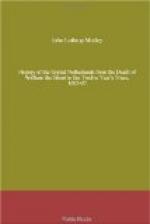The holy Roman and the sublime Ottoman empires had also drifted into temporary peace; the exploits of the Persians and other Asiatic movements having given Ahmed more work than was convenient on his eastern frontier, while Stephen Botshkay had so completely got the better of Rudolph in Transylvania as to make repose desirable. So there was a treaty between the great Turk and the great Christian on the basis of what each possessed; Stephen Botshkay was recognized as prince of Transylvania with part of Hungary, and, when taken off soon afterwards by family poison, he recommended on his death-bed the closest union between Hungary and Transylvania, as well as peace with the emperor, so long as it might be compatible with the rights of the Magyars.
France and England, while suspecting each other, dreading each other, and very sincerely hating each other, were drawn into intimate relations by their common detestation of Spain, with which power both had now formal treaties of alliance and friendship. This was the result of their mighty projects for humbling the house of Austria and annihilating its power. England hated the Netherlands because of the injuries she had done them, the many benefits she had conferred upon them, and more than all on account of the daily increasing commercial rivalry between the two most progressive states in Christendom, the two powers which, comparatively weak as they were in territory, capital, and population, were most in harmony with the spirit of the age.
The Government of England was more hostile than its people to the United Provinces. James never spoke of the Netherlanders but as upstarts and rebels, whose success ought to be looked upon with horror by the Lord’s anointed everywhere. He could not shut his eyes to the fact that, with the republic destroyed, and a Spanish sacerdotal despotism established in Holland and Zeeland, with Jesuit seminaries in full bloom in Amsterdam and the Hague, his own rebels in Ireland might prove more troublesome than ever, and gunpowder plots in London become common occurrences.
The Earl of Tyrone at that very moment was receiving enthusiastic hospitality at the archduke’s court, much to the disgust of the Presbyterian sovereign of the United Kingdom, who nevertheless, despite his cherished theology, was possessed with an unconquerable craving for a close family alliance with the most Catholic king. His ministers were inclined to Spain, and the British Government was at heart favourable to some kind of arrangement by which the Netherlands might be reduced to the authority of their former master, in case no scheme could be carried into, effect for acquiring a virtual sovereignty over those provinces by the British crown. Moreover, and most of all, the King of France being supposed to contemplate the annexation of the Netherlands to his own dominions, the jealousy excited by such ambition made it even possible for James’s Government to tolerate the idea of Dutch independence. Thus the court and cabinet of England were as full of contradictory hopes and projects as a madman’s brain.




